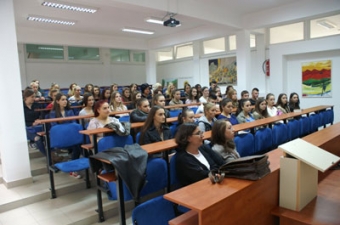With 1.200 students and around 100 teachers, the Combined High School in Srebrenik is one of the bigger schools in Bosnia and Herzegovina. The commitment by the school’s teaching staff to provide extracurricular education opportunities to their students has resulted in great interest for today’s presentation about the ICTY.
During the two hour discussion, around 50 high school students from Srebrenik, listened to an overview given by ICTY Registry Liaison Officer, Almir Alić, of the Tribunal’s work and its major achievements in the past two decades. The students recognised the importance of war crimes’ trials and expressed their hope that national courts would continue with war crimes trials following the closure of the ICTY.
Particularly interesting were the students’ views of the possibility of reconciliation following traumatic experiences that the communities in the former Yugoslavia went through. The majority of students said that reconciliation was possible, offering a wide range of possible solutions. One 17-year old student said that reconciliation could be achieved through “recognition of facts and admission of guilt”, while her one year younger fellow student said she believed the best way to do that is “by calling to account individuals, and not the entire countries”.
The students also agreed “that all parties to the conflict should stop glorifying those who committed crimes”, while one of the students stressed the importance of “having those who committed crimes reveal the exact locations of mass graves”. The importance of facing the past for young generations was also underlined by another student from Srebrenik, who stressed that “correctly educating young people about the war and lessons from the past” is of crucial importance.
A group of high school teachers, who also attended the presentation, welcomed such educational activities and invited the Tribunal’s Outreach programme to extend their cooperation with the High School in Srebrenik.


